Report on Entrepreneurship and Small Business Management - University
VerifiedAdded on 2021/01/02
|16
|5217
|196
Report
AI Summary
This report delves into the multifaceted world of entrepreneurship and its significance in small business management. It begins by defining and categorizing different types of entrepreneurial ventures, including small businesses, scalable start-ups, large companies, and social enterprises, while also highlighting their similarities and differences. The report then analyzes the impact of micro and small businesses on the economy, particularly within the context of the United Kingdom, and explores the importance of these businesses for economic growth, especially after Brexit. Furthermore, it examines the characteristics, traits, and skills essential for entrepreneurial success, including an explanation of entrepreneurial motivation and mindset. Finally, the report discusses factors that either foster or hinder entrepreneurial endeavors, providing a comprehensive overview of the key elements driving entrepreneurship in today's business environment.

ENTREPRENEURSHIP
AND SMALL BUSINESS
MANAGEMENT
AND SMALL BUSINESS
MANAGEMENT
Paraphrase This Document
Need a fresh take? Get an instant paraphrase of this document with our AI Paraphraser
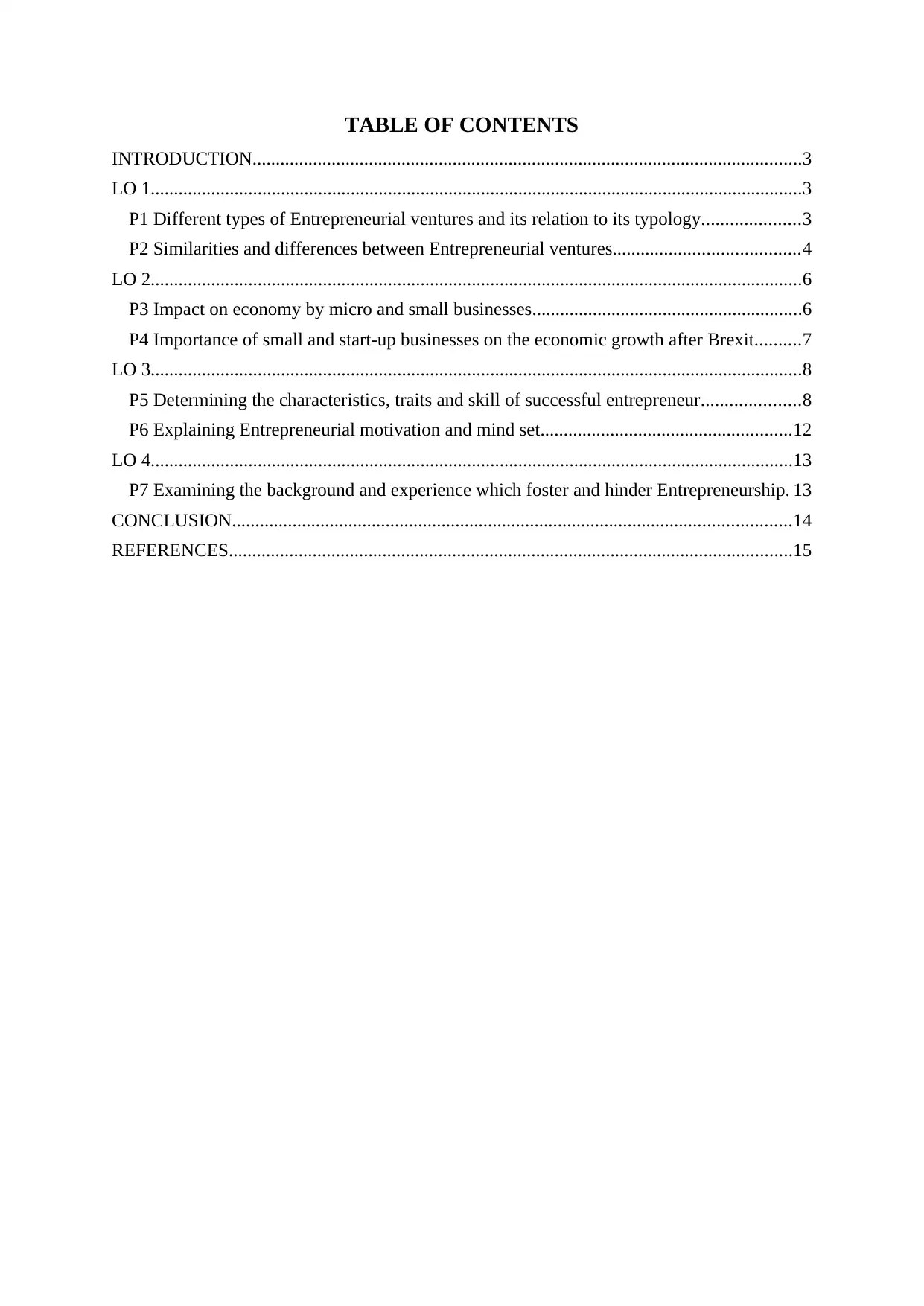
TABLE OF CONTENTS
INTRODUCTION......................................................................................................................3
LO 1............................................................................................................................................3
P1 Different types of Entrepreneurial ventures and its relation to its typology.....................3
P2 Similarities and differences between Entrepreneurial ventures........................................4
LO 2............................................................................................................................................6
P3 Impact on economy by micro and small businesses..........................................................6
P4 Importance of small and start-up businesses on the economic growth after Brexit..........7
LO 3............................................................................................................................................8
P5 Determining the characteristics, traits and skill of successful entrepreneur.....................8
P6 Explaining Entrepreneurial motivation and mind set......................................................12
LO 4..........................................................................................................................................13
P7 Examining the background and experience which foster and hinder Entrepreneurship. 13
CONCLUSION........................................................................................................................14
REFERENCES.........................................................................................................................15
INTRODUCTION......................................................................................................................3
LO 1............................................................................................................................................3
P1 Different types of Entrepreneurial ventures and its relation to its typology.....................3
P2 Similarities and differences between Entrepreneurial ventures........................................4
LO 2............................................................................................................................................6
P3 Impact on economy by micro and small businesses..........................................................6
P4 Importance of small and start-up businesses on the economic growth after Brexit..........7
LO 3............................................................................................................................................8
P5 Determining the characteristics, traits and skill of successful entrepreneur.....................8
P6 Explaining Entrepreneurial motivation and mind set......................................................12
LO 4..........................................................................................................................................13
P7 Examining the background and experience which foster and hinder Entrepreneurship. 13
CONCLUSION........................................................................................................................14
REFERENCES.........................................................................................................................15
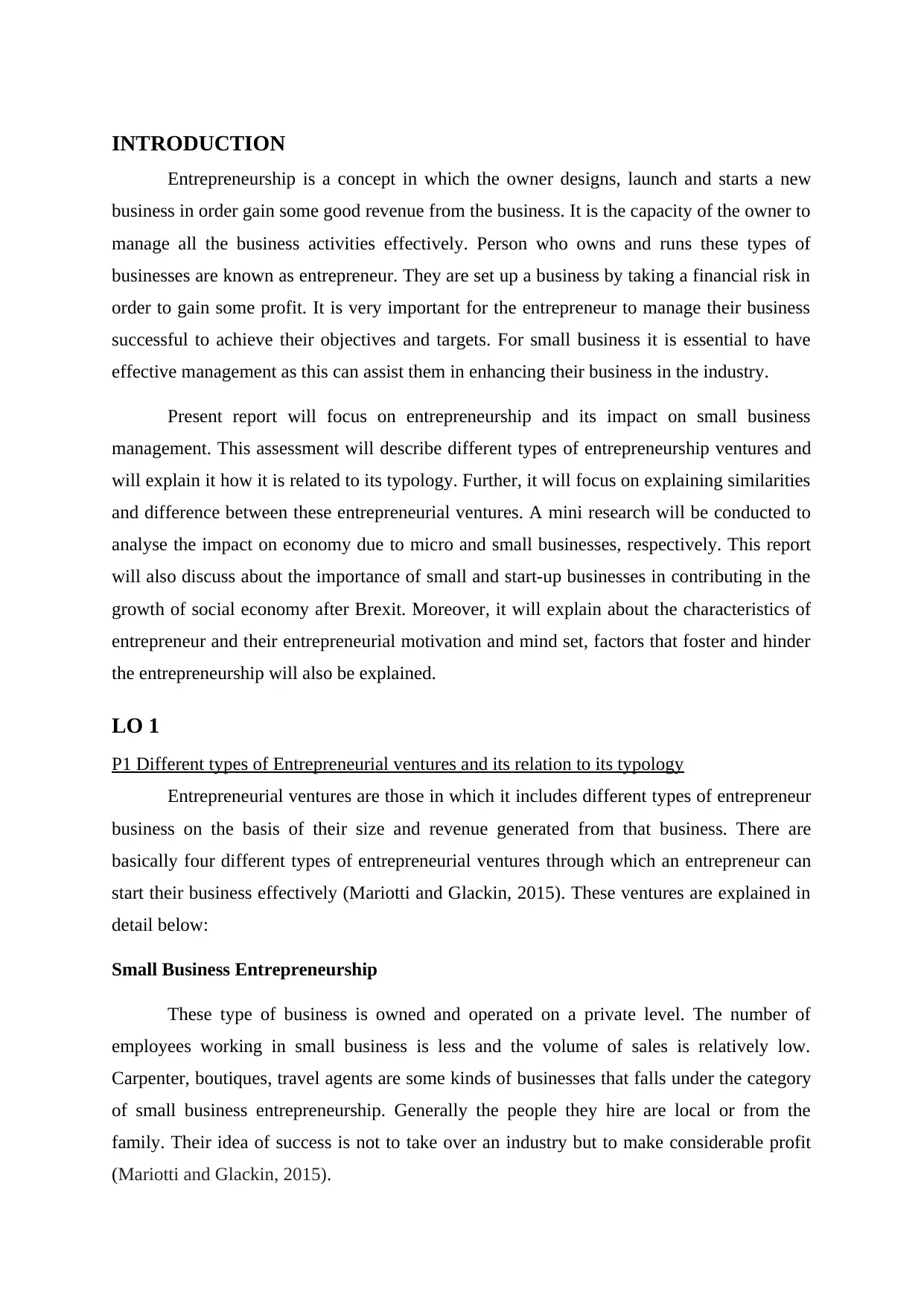
INTRODUCTION
Entrepreneurship is a concept in which the owner designs, launch and starts a new
business in order gain some good revenue from the business. It is the capacity of the owner to
manage all the business activities effectively. Person who owns and runs these types of
businesses are known as entrepreneur. They are set up a business by taking a financial risk in
order to gain some profit. It is very important for the entrepreneur to manage their business
successful to achieve their objectives and targets. For small business it is essential to have
effective management as this can assist them in enhancing their business in the industry.
Present report will focus on entrepreneurship and its impact on small business
management. This assessment will describe different types of entrepreneurship ventures and
will explain it how it is related to its typology. Further, it will focus on explaining similarities
and difference between these entrepreneurial ventures. A mini research will be conducted to
analyse the impact on economy due to micro and small businesses, respectively. This report
will also discuss about the importance of small and start-up businesses in contributing in the
growth of social economy after Brexit. Moreover, it will explain about the characteristics of
entrepreneur and their entrepreneurial motivation and mind set, factors that foster and hinder
the entrepreneurship will also be explained.
LO 1
P1 Different types of Entrepreneurial ventures and its relation to its typology
Entrepreneurial ventures are those in which it includes different types of entrepreneur
business on the basis of their size and revenue generated from that business. There are
basically four different types of entrepreneurial ventures through which an entrepreneur can
start their business effectively (Mariotti and Glackin, 2015). These ventures are explained in
detail below:
Small Business Entrepreneurship
These type of business is owned and operated on a private level. The number of
employees working in small business is less and the volume of sales is relatively low.
Carpenter, boutiques, travel agents are some kinds of businesses that falls under the category
of small business entrepreneurship. Generally the people they hire are local or from the
family. Their idea of success is not to take over an industry but to make considerable profit
(Mariotti and Glackin, 2015).
Entrepreneurship is a concept in which the owner designs, launch and starts a new
business in order gain some good revenue from the business. It is the capacity of the owner to
manage all the business activities effectively. Person who owns and runs these types of
businesses are known as entrepreneur. They are set up a business by taking a financial risk in
order to gain some profit. It is very important for the entrepreneur to manage their business
successful to achieve their objectives and targets. For small business it is essential to have
effective management as this can assist them in enhancing their business in the industry.
Present report will focus on entrepreneurship and its impact on small business
management. This assessment will describe different types of entrepreneurship ventures and
will explain it how it is related to its typology. Further, it will focus on explaining similarities
and difference between these entrepreneurial ventures. A mini research will be conducted to
analyse the impact on economy due to micro and small businesses, respectively. This report
will also discuss about the importance of small and start-up businesses in contributing in the
growth of social economy after Brexit. Moreover, it will explain about the characteristics of
entrepreneur and their entrepreneurial motivation and mind set, factors that foster and hinder
the entrepreneurship will also be explained.
LO 1
P1 Different types of Entrepreneurial ventures and its relation to its typology
Entrepreneurial ventures are those in which it includes different types of entrepreneur
business on the basis of their size and revenue generated from that business. There are
basically four different types of entrepreneurial ventures through which an entrepreneur can
start their business effectively (Mariotti and Glackin, 2015). These ventures are explained in
detail below:
Small Business Entrepreneurship
These type of business is owned and operated on a private level. The number of
employees working in small business is less and the volume of sales is relatively low.
Carpenter, boutiques, travel agents are some kinds of businesses that falls under the category
of small business entrepreneurship. Generally the people they hire are local or from the
family. Their idea of success is not to take over an industry but to make considerable profit
(Mariotti and Glackin, 2015).
⊘ This is a preview!⊘
Do you want full access?
Subscribe today to unlock all pages.

Trusted by 1+ million students worldwide
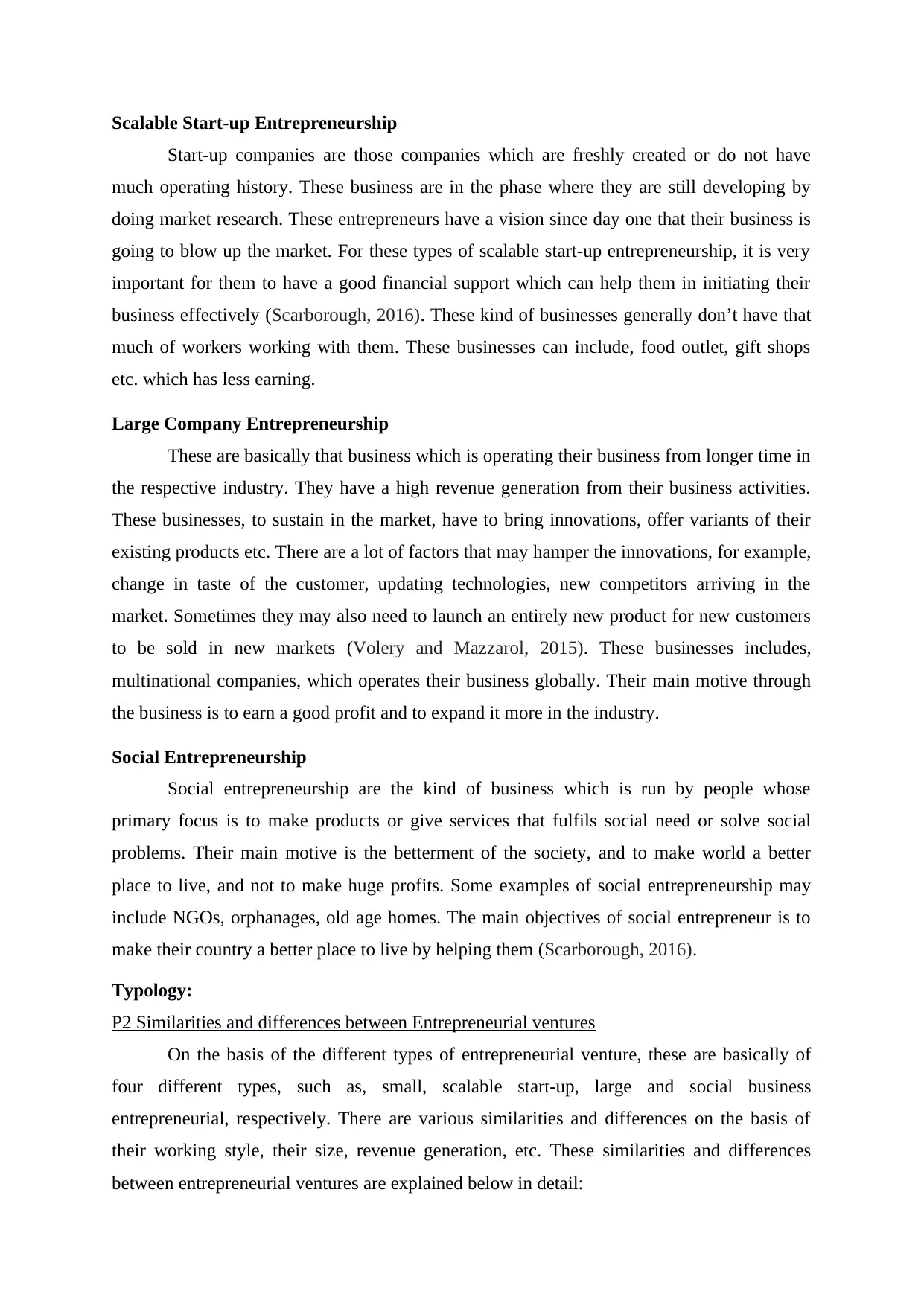
Scalable Start-up Entrepreneurship
Start-up companies are those companies which are freshly created or do not have
much operating history. These business are in the phase where they are still developing by
doing market research. These entrepreneurs have a vision since day one that their business is
going to blow up the market. For these types of scalable start-up entrepreneurship, it is very
important for them to have a good financial support which can help them in initiating their
business effectively (Scarborough, 2016). These kind of businesses generally don’t have that
much of workers working with them. These businesses can include, food outlet, gift shops
etc. which has less earning.
Large Company Entrepreneurship
These are basically that business which is operating their business from longer time in
the respective industry. They have a high revenue generation from their business activities.
These businesses, to sustain in the market, have to bring innovations, offer variants of their
existing products etc. There are a lot of factors that may hamper the innovations, for example,
change in taste of the customer, updating technologies, new competitors arriving in the
market. Sometimes they may also need to launch an entirely new product for new customers
to be sold in new markets (Volery and Mazzarol, 2015). These businesses includes,
multinational companies, which operates their business globally. Their main motive through
the business is to earn a good profit and to expand it more in the industry.
Social Entrepreneurship
Social entrepreneurship are the kind of business which is run by people whose
primary focus is to make products or give services that fulfils social need or solve social
problems. Their main motive is the betterment of the society, and to make world a better
place to live, and not to make huge profits. Some examples of social entrepreneurship may
include NGOs, orphanages, old age homes. The main objectives of social entrepreneur is to
make their country a better place to live by helping them (Scarborough, 2016).
Typology:
P2 Similarities and differences between Entrepreneurial ventures
On the basis of the different types of entrepreneurial venture, these are basically of
four different types, such as, small, scalable start-up, large and social business
entrepreneurial, respectively. There are various similarities and differences on the basis of
their working style, their size, revenue generation, etc. These similarities and differences
between entrepreneurial ventures are explained below in detail:
Start-up companies are those companies which are freshly created or do not have
much operating history. These business are in the phase where they are still developing by
doing market research. These entrepreneurs have a vision since day one that their business is
going to blow up the market. For these types of scalable start-up entrepreneurship, it is very
important for them to have a good financial support which can help them in initiating their
business effectively (Scarborough, 2016). These kind of businesses generally don’t have that
much of workers working with them. These businesses can include, food outlet, gift shops
etc. which has less earning.
Large Company Entrepreneurship
These are basically that business which is operating their business from longer time in
the respective industry. They have a high revenue generation from their business activities.
These businesses, to sustain in the market, have to bring innovations, offer variants of their
existing products etc. There are a lot of factors that may hamper the innovations, for example,
change in taste of the customer, updating technologies, new competitors arriving in the
market. Sometimes they may also need to launch an entirely new product for new customers
to be sold in new markets (Volery and Mazzarol, 2015). These businesses includes,
multinational companies, which operates their business globally. Their main motive through
the business is to earn a good profit and to expand it more in the industry.
Social Entrepreneurship
Social entrepreneurship are the kind of business which is run by people whose
primary focus is to make products or give services that fulfils social need or solve social
problems. Their main motive is the betterment of the society, and to make world a better
place to live, and not to make huge profits. Some examples of social entrepreneurship may
include NGOs, orphanages, old age homes. The main objectives of social entrepreneur is to
make their country a better place to live by helping them (Scarborough, 2016).
Typology:
P2 Similarities and differences between Entrepreneurial ventures
On the basis of the different types of entrepreneurial venture, these are basically of
four different types, such as, small, scalable start-up, large and social business
entrepreneurial, respectively. There are various similarities and differences on the basis of
their working style, their size, revenue generation, etc. These similarities and differences
between entrepreneurial ventures are explained below in detail:
Paraphrase This Document
Need a fresh take? Get an instant paraphrase of this document with our AI Paraphraser
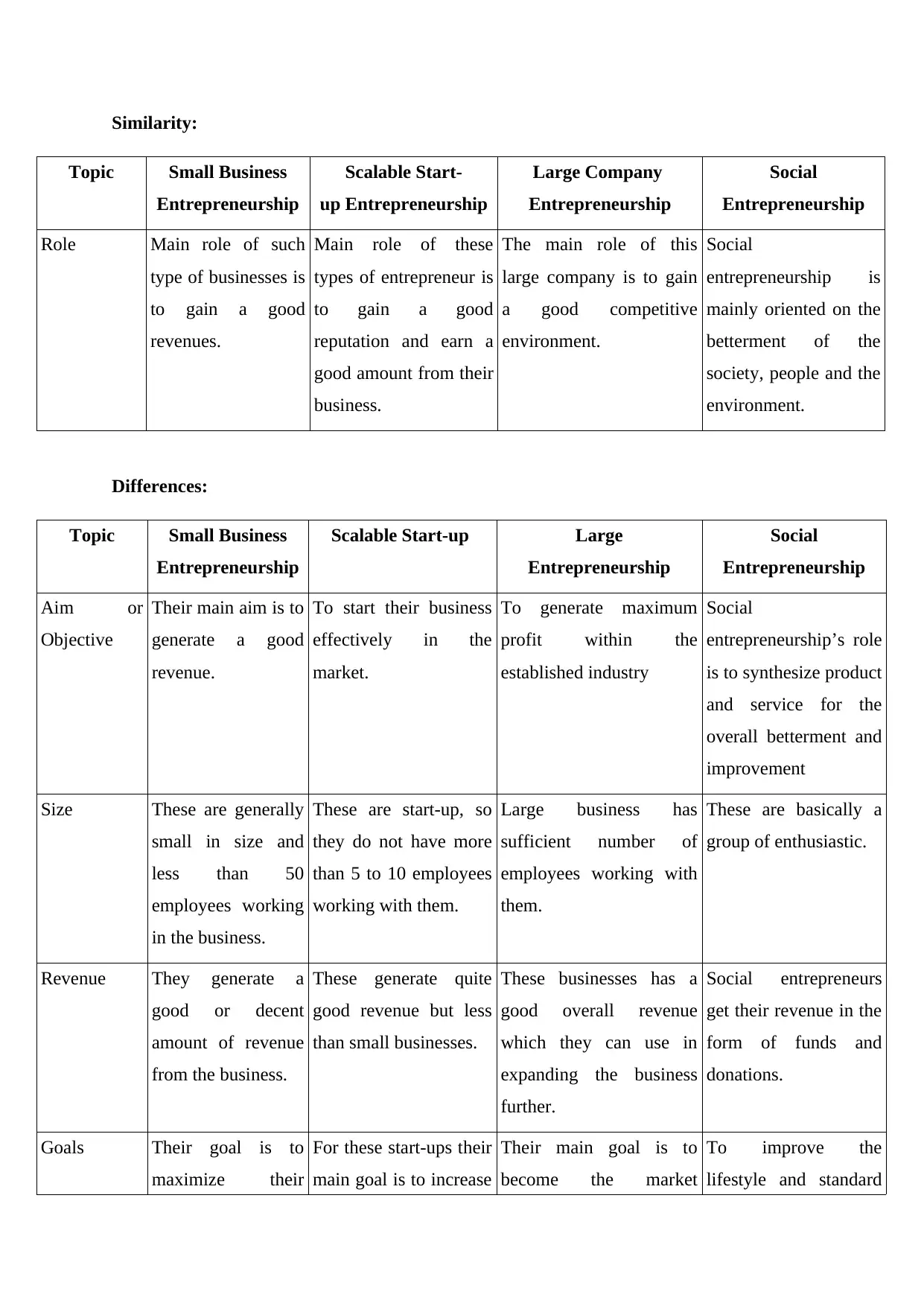
Similarity:
Topic Small Business
Entrepreneurship
Scalable Start-
up Entrepreneurship
Large Company
Entrepreneurship
Social
Entrepreneurship
Role Main role of such
type of businesses is
to gain a good
revenues.
Main role of these
types of entrepreneur is
to gain a good
reputation and earn a
good amount from their
business.
The main role of this
large company is to gain
a good competitive
environment.
Social
entrepreneurship is
mainly oriented on the
betterment of the
society, people and the
environment.
Differences:
Topic Small Business
Entrepreneurship
Scalable Start-up Large
Entrepreneurship
Social
Entrepreneurship
Aim or
Objective
Their main aim is to
generate a good
revenue.
To start their business
effectively in the
market.
To generate maximum
profit within the
established industry
Social
entrepreneurship’s role
is to synthesize product
and service for the
overall betterment and
improvement
Size These are generally
small in size and
less than 50
employees working
in the business.
These are start-up, so
they do not have more
than 5 to 10 employees
working with them.
Large business has
sufficient number of
employees working with
them.
These are basically a
group of enthusiastic.
Revenue They generate a
good or decent
amount of revenue
from the business.
These generate quite
good revenue but less
than small businesses.
These businesses has a
good overall revenue
which they can use in
expanding the business
further.
Social entrepreneurs
get their revenue in the
form of funds and
donations.
Goals Their goal is to
maximize their
For these start-ups their
main goal is to increase
Their main goal is to
become the market
To improve the
lifestyle and standard
Topic Small Business
Entrepreneurship
Scalable Start-
up Entrepreneurship
Large Company
Entrepreneurship
Social
Entrepreneurship
Role Main role of such
type of businesses is
to gain a good
revenues.
Main role of these
types of entrepreneur is
to gain a good
reputation and earn a
good amount from their
business.
The main role of this
large company is to gain
a good competitive
environment.
Social
entrepreneurship is
mainly oriented on the
betterment of the
society, people and the
environment.
Differences:
Topic Small Business
Entrepreneurship
Scalable Start-up Large
Entrepreneurship
Social
Entrepreneurship
Aim or
Objective
Their main aim is to
generate a good
revenue.
To start their business
effectively in the
market.
To generate maximum
profit within the
established industry
Social
entrepreneurship’s role
is to synthesize product
and service for the
overall betterment and
improvement
Size These are generally
small in size and
less than 50
employees working
in the business.
These are start-up, so
they do not have more
than 5 to 10 employees
working with them.
Large business has
sufficient number of
employees working with
them.
These are basically a
group of enthusiastic.
Revenue They generate a
good or decent
amount of revenue
from the business.
These generate quite
good revenue but less
than small businesses.
These businesses has a
good overall revenue
which they can use in
expanding the business
further.
Social entrepreneurs
get their revenue in the
form of funds and
donations.
Goals Their goal is to
maximize their
For these start-ups their
main goal is to increase
Their main goal is to
become the market
To improve the
lifestyle and standard
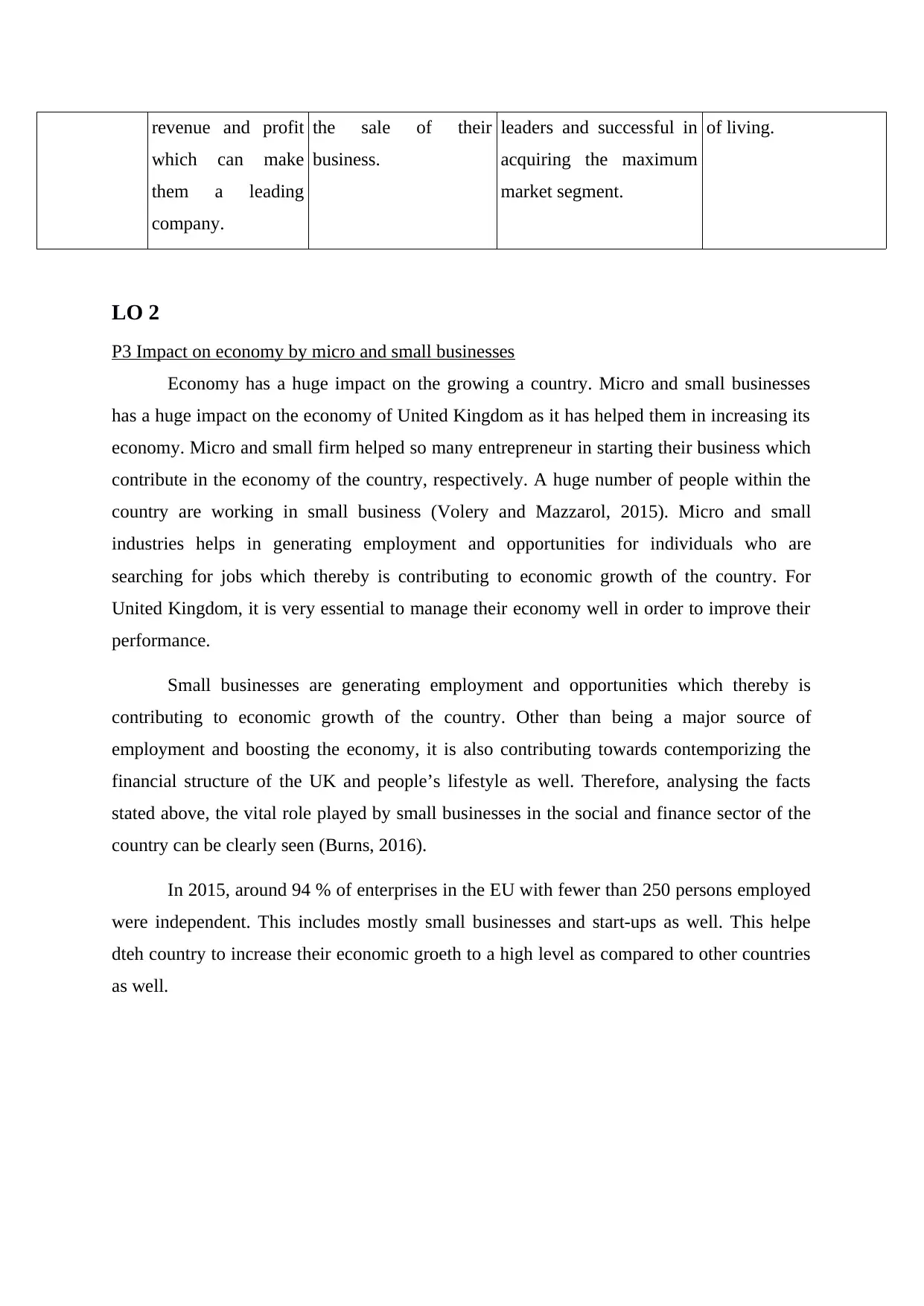
revenue and profit
which can make
them a leading
company.
the sale of their
business.
leaders and successful in
acquiring the maximum
market segment.
of living.
LO 2
P3 Impact on economy by micro and small businesses
Economy has a huge impact on the growing a country. Micro and small businesses
has a huge impact on the economy of United Kingdom as it has helped them in increasing its
economy. Micro and small firm helped so many entrepreneur in starting their business which
contribute in the economy of the country, respectively. A huge number of people within the
country are working in small business (Volery and Mazzarol, 2015). Micro and small
industries helps in generating employment and opportunities for individuals who are
searching for jobs which thereby is contributing to economic growth of the country. For
United Kingdom, it is very essential to manage their economy well in order to improve their
performance.
Small businesses are generating employment and opportunities which thereby is
contributing to economic growth of the country. Other than being a major source of
employment and boosting the economy, it is also contributing towards contemporizing the
financial structure of the UK and people’s lifestyle as well. Therefore, analysing the facts
stated above, the vital role played by small businesses in the social and finance sector of the
country can be clearly seen (Burns, 2016).
In 2015, around 94 % of enterprises in the EU with fewer than 250 persons employed
were independent. This includes mostly small businesses and start-ups as well. This helpe
dteh country to increase their economic groeth to a high level as compared to other countries
as well.
which can make
them a leading
company.
the sale of their
business.
leaders and successful in
acquiring the maximum
market segment.
of living.
LO 2
P3 Impact on economy by micro and small businesses
Economy has a huge impact on the growing a country. Micro and small businesses
has a huge impact on the economy of United Kingdom as it has helped them in increasing its
economy. Micro and small firm helped so many entrepreneur in starting their business which
contribute in the economy of the country, respectively. A huge number of people within the
country are working in small business (Volery and Mazzarol, 2015). Micro and small
industries helps in generating employment and opportunities for individuals who are
searching for jobs which thereby is contributing to economic growth of the country. For
United Kingdom, it is very essential to manage their economy well in order to improve their
performance.
Small businesses are generating employment and opportunities which thereby is
contributing to economic growth of the country. Other than being a major source of
employment and boosting the economy, it is also contributing towards contemporizing the
financial structure of the UK and people’s lifestyle as well. Therefore, analysing the facts
stated above, the vital role played by small businesses in the social and finance sector of the
country can be clearly seen (Burns, 2016).
In 2015, around 94 % of enterprises in the EU with fewer than 250 persons employed
were independent. This includes mostly small businesses and start-ups as well. This helpe
dteh country to increase their economic groeth to a high level as compared to other countries
as well.
⊘ This is a preview!⊘
Do you want full access?
Subscribe today to unlock all pages.

Trusted by 1+ million students worldwide
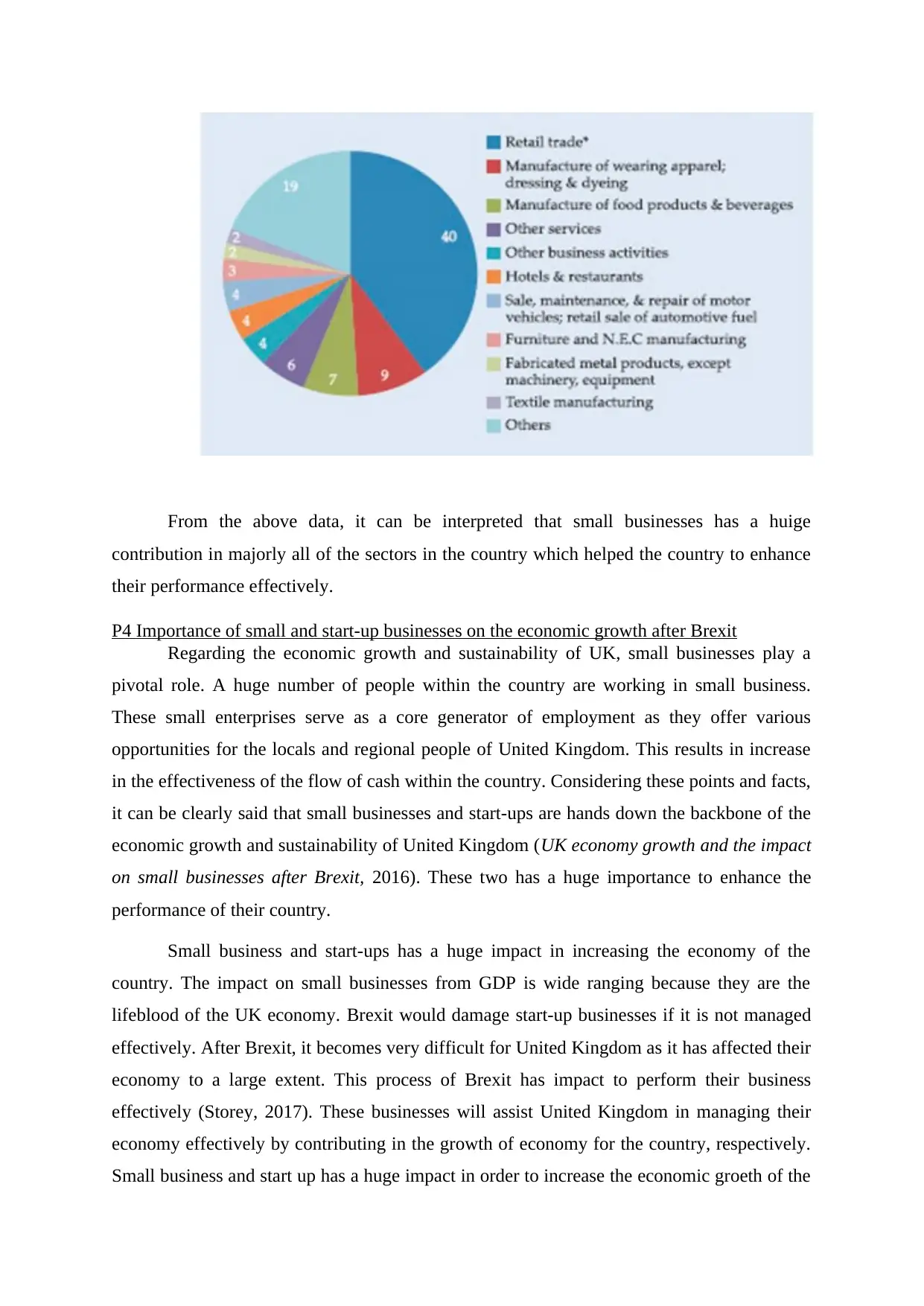
From the above data, it can be interpreted that small businesses has a huige
contribution in majorly all of the sectors in the country which helped the country to enhance
their performance effectively.
P4 Importance of small and start-up businesses on the economic growth after Brexit
Regarding the economic growth and sustainability of UK, small businesses play a
pivotal role. A huge number of people within the country are working in small business.
These small enterprises serve as a core generator of employment as they offer various
opportunities for the locals and regional people of United Kingdom. This results in increase
in the effectiveness of the flow of cash within the country. Considering these points and facts,
it can be clearly said that small businesses and start-ups are hands down the backbone of the
economic growth and sustainability of United Kingdom (UK economy growth and the impact
on small businesses after Brexit, 2016). These two has a huge importance to enhance the
performance of their country.
Small business and start-ups has a huge impact in increasing the economy of the
country. The impact on small businesses from GDP is wide ranging because they are the
lifeblood of the UK economy. Brexit would damage start-up businesses if it is not managed
effectively. After Brexit, it becomes very difficult for United Kingdom as it has affected their
economy to a large extent. This process of Brexit has impact to perform their business
effectively (Storey, 2017). These businesses will assist United Kingdom in managing their
economy effectively by contributing in the growth of economy for the country, respectively.
Small business and start up has a huge impact in order to increase the economic groeth of the
contribution in majorly all of the sectors in the country which helped the country to enhance
their performance effectively.
P4 Importance of small and start-up businesses on the economic growth after Brexit
Regarding the economic growth and sustainability of UK, small businesses play a
pivotal role. A huge number of people within the country are working in small business.
These small enterprises serve as a core generator of employment as they offer various
opportunities for the locals and regional people of United Kingdom. This results in increase
in the effectiveness of the flow of cash within the country. Considering these points and facts,
it can be clearly said that small businesses and start-ups are hands down the backbone of the
economic growth and sustainability of United Kingdom (UK economy growth and the impact
on small businesses after Brexit, 2016). These two has a huge importance to enhance the
performance of their country.
Small business and start-ups has a huge impact in increasing the economy of the
country. The impact on small businesses from GDP is wide ranging because they are the
lifeblood of the UK economy. Brexit would damage start-up businesses if it is not managed
effectively. After Brexit, it becomes very difficult for United Kingdom as it has affected their
economy to a large extent. This process of Brexit has impact to perform their business
effectively (Storey, 2017). These businesses will assist United Kingdom in managing their
economy effectively by contributing in the growth of economy for the country, respectively.
Small business and start up has a huge impact in order to increase the economic groeth of the
Paraphrase This Document
Need a fresh take? Get an instant paraphrase of this document with our AI Paraphraser
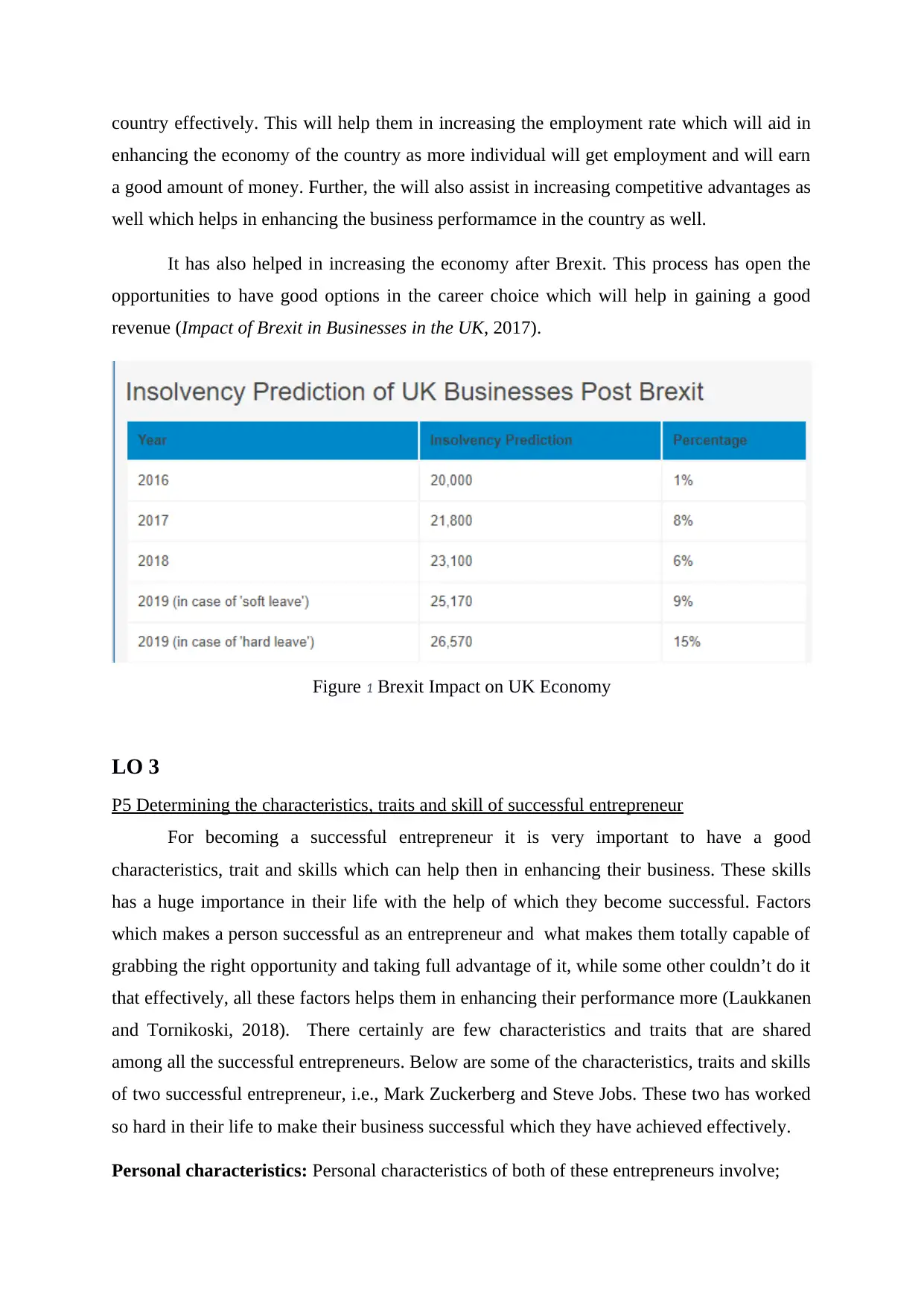
country effectively. This will help them in increasing the employment rate which will aid in
enhancing the economy of the country as more individual will get employment and will earn
a good amount of money. Further, the will also assist in increasing competitive advantages as
well which helps in enhancing the business performamce in the country as well.
It has also helped in increasing the economy after Brexit. This process has open the
opportunities to have good options in the career choice which will help in gaining a good
revenue (Impact of Brexit in Businesses in the UK, 2017).
Figure 1 Brexit Impact on UK Economy
LO 3
P5 Determining the characteristics, traits and skill of successful entrepreneur
For becoming a successful entrepreneur it is very important to have a good
characteristics, trait and skills which can help then in enhancing their business. These skills
has a huge importance in their life with the help of which they become successful. Factors
which makes a person successful as an entrepreneur and what makes them totally capable of
grabbing the right opportunity and taking full advantage of it, while some other couldn’t do it
that effectively, all these factors helps them in enhancing their performance more (Laukkanen
and Tornikoski, 2018). There certainly are few characteristics and traits that are shared
among all the successful entrepreneurs. Below are some of the characteristics, traits and skills
of two successful entrepreneur, i.e., Mark Zuckerberg and Steve Jobs. These two has worked
so hard in their life to make their business successful which they have achieved effectively.
Personal characteristics: Personal characteristics of both of these entrepreneurs involve;
enhancing the economy of the country as more individual will get employment and will earn
a good amount of money. Further, the will also assist in increasing competitive advantages as
well which helps in enhancing the business performamce in the country as well.
It has also helped in increasing the economy after Brexit. This process has open the
opportunities to have good options in the career choice which will help in gaining a good
revenue (Impact of Brexit in Businesses in the UK, 2017).
Figure 1 Brexit Impact on UK Economy
LO 3
P5 Determining the characteristics, traits and skill of successful entrepreneur
For becoming a successful entrepreneur it is very important to have a good
characteristics, trait and skills which can help then in enhancing their business. These skills
has a huge importance in their life with the help of which they become successful. Factors
which makes a person successful as an entrepreneur and what makes them totally capable of
grabbing the right opportunity and taking full advantage of it, while some other couldn’t do it
that effectively, all these factors helps them in enhancing their performance more (Laukkanen
and Tornikoski, 2018). There certainly are few characteristics and traits that are shared
among all the successful entrepreneurs. Below are some of the characteristics, traits and skills
of two successful entrepreneur, i.e., Mark Zuckerberg and Steve Jobs. These two has worked
so hard in their life to make their business successful which they have achieved effectively.
Personal characteristics: Personal characteristics of both of these entrepreneurs involve;
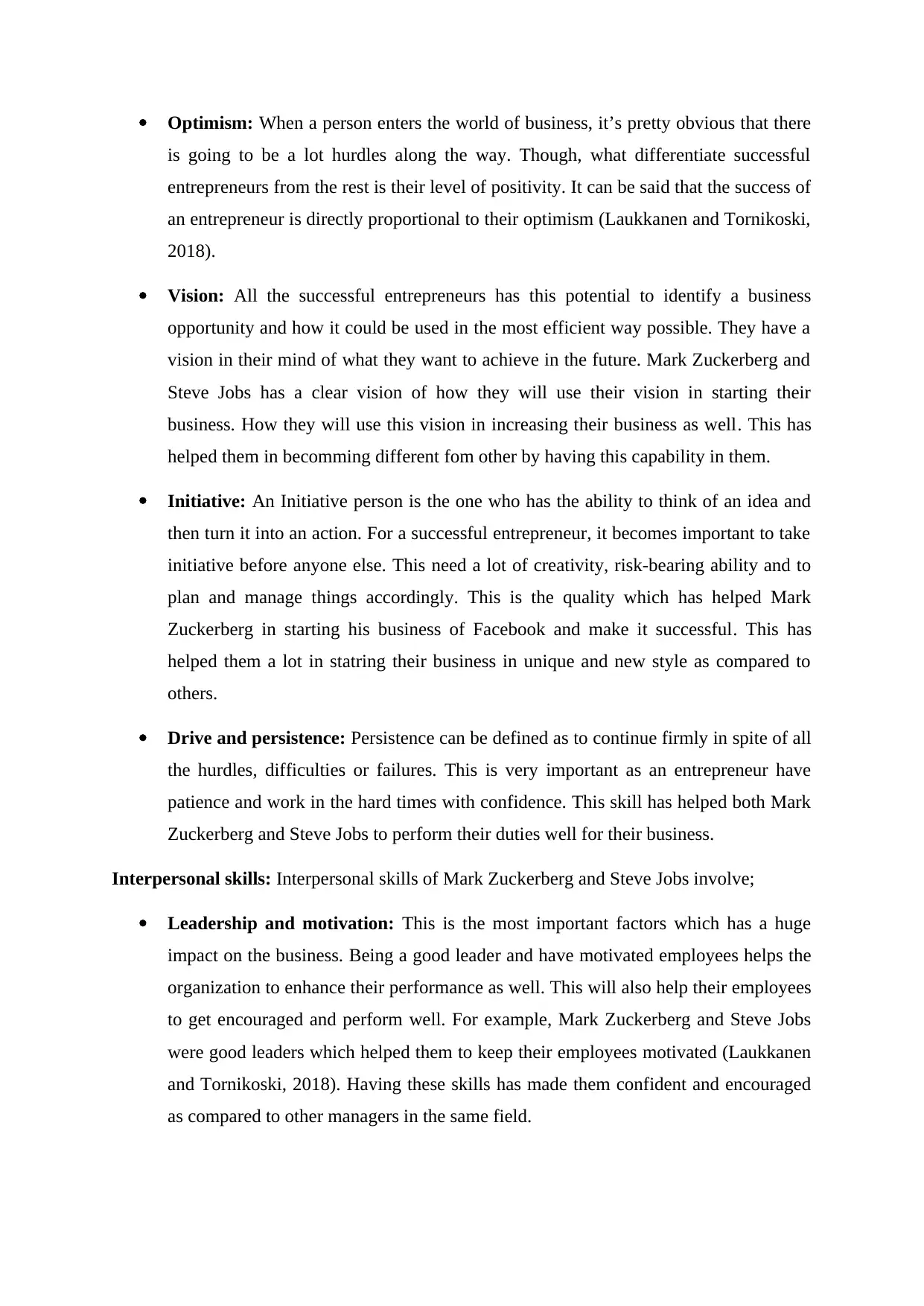
Optimism: When a person enters the world of business, it’s pretty obvious that there
is going to be a lot hurdles along the way. Though, what differentiate successful
entrepreneurs from the rest is their level of positivity. It can be said that the success of
an entrepreneur is directly proportional to their optimism (Laukkanen and Tornikoski,
2018).
Vision: All the successful entrepreneurs has this potential to identify a business
opportunity and how it could be used in the most efficient way possible. They have a
vision in their mind of what they want to achieve in the future. Mark Zuckerberg and
Steve Jobs has a clear vision of how they will use their vision in starting their
business. How they will use this vision in increasing their business as well. This has
helped them in becomming different fom other by having this capability in them.
Initiative: An Initiative person is the one who has the ability to think of an idea and
then turn it into an action. For a successful entrepreneur, it becomes important to take
initiative before anyone else. This need a lot of creativity, risk-bearing ability and to
plan and manage things accordingly. This is the quality which has helped Mark
Zuckerberg in starting his business of Facebook and make it successful. This has
helped them a lot in statring their business in unique and new style as compared to
others.
Drive and persistence: Persistence can be defined as to continue firmly in spite of all
the hurdles, difficulties or failures. This is very important as an entrepreneur have
patience and work in the hard times with confidence. This skill has helped both Mark
Zuckerberg and Steve Jobs to perform their duties well for their business.
Interpersonal skills: Interpersonal skills of Mark Zuckerberg and Steve Jobs involve;
Leadership and motivation: This is the most important factors which has a huge
impact on the business. Being a good leader and have motivated employees helps the
organization to enhance their performance as well. This will also help their employees
to get encouraged and perform well. For example, Mark Zuckerberg and Steve Jobs
were good leaders which helped them to keep their employees motivated (Laukkanen
and Tornikoski, 2018). Having these skills has made them confident and encouraged
as compared to other managers in the same field.
is going to be a lot hurdles along the way. Though, what differentiate successful
entrepreneurs from the rest is their level of positivity. It can be said that the success of
an entrepreneur is directly proportional to their optimism (Laukkanen and Tornikoski,
2018).
Vision: All the successful entrepreneurs has this potential to identify a business
opportunity and how it could be used in the most efficient way possible. They have a
vision in their mind of what they want to achieve in the future. Mark Zuckerberg and
Steve Jobs has a clear vision of how they will use their vision in starting their
business. How they will use this vision in increasing their business as well. This has
helped them in becomming different fom other by having this capability in them.
Initiative: An Initiative person is the one who has the ability to think of an idea and
then turn it into an action. For a successful entrepreneur, it becomes important to take
initiative before anyone else. This need a lot of creativity, risk-bearing ability and to
plan and manage things accordingly. This is the quality which has helped Mark
Zuckerberg in starting his business of Facebook and make it successful. This has
helped them a lot in statring their business in unique and new style as compared to
others.
Drive and persistence: Persistence can be defined as to continue firmly in spite of all
the hurdles, difficulties or failures. This is very important as an entrepreneur have
patience and work in the hard times with confidence. This skill has helped both Mark
Zuckerberg and Steve Jobs to perform their duties well for their business.
Interpersonal skills: Interpersonal skills of Mark Zuckerberg and Steve Jobs involve;
Leadership and motivation: This is the most important factors which has a huge
impact on the business. Being a good leader and have motivated employees helps the
organization to enhance their performance as well. This will also help their employees
to get encouraged and perform well. For example, Mark Zuckerberg and Steve Jobs
were good leaders which helped them to keep their employees motivated (Laukkanen
and Tornikoski, 2018). Having these skills has made them confident and encouraged
as compared to other managers in the same field.
⊘ This is a preview!⊘
Do you want full access?
Subscribe today to unlock all pages.

Trusted by 1+ million students worldwide
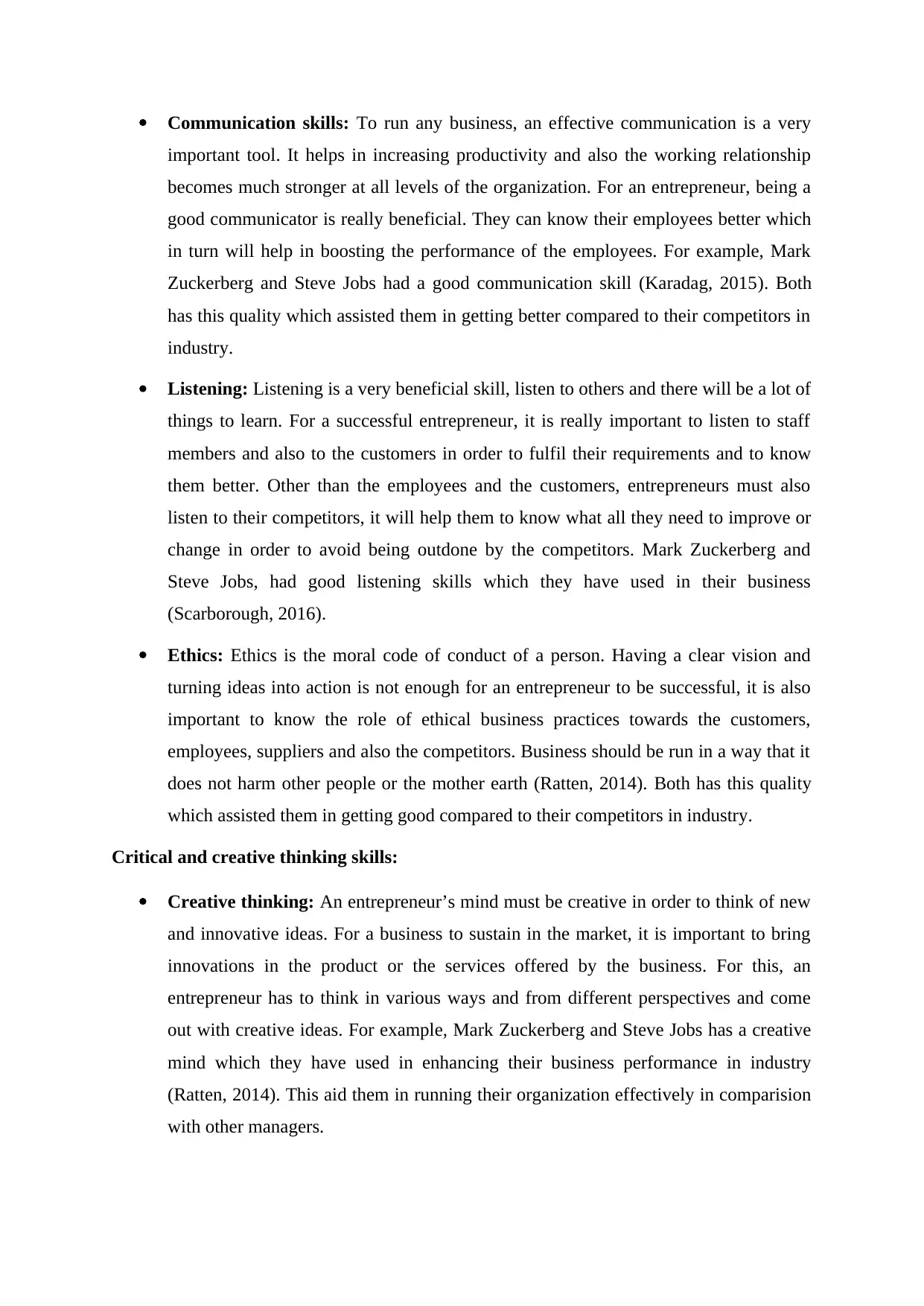
Communication skills: To run any business, an effective communication is a very
important tool. It helps in increasing productivity and also the working relationship
becomes much stronger at all levels of the organization. For an entrepreneur, being a
good communicator is really beneficial. They can know their employees better which
in turn will help in boosting the performance of the employees. For example, Mark
Zuckerberg and Steve Jobs had a good communication skill (Karadag, 2015). Both
has this quality which assisted them in getting better compared to their competitors in
industry.
Listening: Listening is a very beneficial skill, listen to others and there will be a lot of
things to learn. For a successful entrepreneur, it is really important to listen to staff
members and also to the customers in order to fulfil their requirements and to know
them better. Other than the employees and the customers, entrepreneurs must also
listen to their competitors, it will help them to know what all they need to improve or
change in order to avoid being outdone by the competitors. Mark Zuckerberg and
Steve Jobs, had good listening skills which they have used in their business
(Scarborough, 2016).
Ethics: Ethics is the moral code of conduct of a person. Having a clear vision and
turning ideas into action is not enough for an entrepreneur to be successful, it is also
important to know the role of ethical business practices towards the customers,
employees, suppliers and also the competitors. Business should be run in a way that it
does not harm other people or the mother earth (Ratten, 2014). Both has this quality
which assisted them in getting good compared to their competitors in industry.
Critical and creative thinking skills:
Creative thinking: An entrepreneur’s mind must be creative in order to think of new
and innovative ideas. For a business to sustain in the market, it is important to bring
innovations in the product or the services offered by the business. For this, an
entrepreneur has to think in various ways and from different perspectives and come
out with creative ideas. For example, Mark Zuckerberg and Steve Jobs has a creative
mind which they have used in enhancing their business performance in industry
(Ratten, 2014). This aid them in running their organization effectively in comparision
with other managers.
important tool. It helps in increasing productivity and also the working relationship
becomes much stronger at all levels of the organization. For an entrepreneur, being a
good communicator is really beneficial. They can know their employees better which
in turn will help in boosting the performance of the employees. For example, Mark
Zuckerberg and Steve Jobs had a good communication skill (Karadag, 2015). Both
has this quality which assisted them in getting better compared to their competitors in
industry.
Listening: Listening is a very beneficial skill, listen to others and there will be a lot of
things to learn. For a successful entrepreneur, it is really important to listen to staff
members and also to the customers in order to fulfil their requirements and to know
them better. Other than the employees and the customers, entrepreneurs must also
listen to their competitors, it will help them to know what all they need to improve or
change in order to avoid being outdone by the competitors. Mark Zuckerberg and
Steve Jobs, had good listening skills which they have used in their business
(Scarborough, 2016).
Ethics: Ethics is the moral code of conduct of a person. Having a clear vision and
turning ideas into action is not enough for an entrepreneur to be successful, it is also
important to know the role of ethical business practices towards the customers,
employees, suppliers and also the competitors. Business should be run in a way that it
does not harm other people or the mother earth (Ratten, 2014). Both has this quality
which assisted them in getting good compared to their competitors in industry.
Critical and creative thinking skills:
Creative thinking: An entrepreneur’s mind must be creative in order to think of new
and innovative ideas. For a business to sustain in the market, it is important to bring
innovations in the product or the services offered by the business. For this, an
entrepreneur has to think in various ways and from different perspectives and come
out with creative ideas. For example, Mark Zuckerberg and Steve Jobs has a creative
mind which they have used in enhancing their business performance in industry
(Ratten, 2014). This aid them in running their organization effectively in comparision
with other managers.
Paraphrase This Document
Need a fresh take? Get an instant paraphrase of this document with our AI Paraphraser
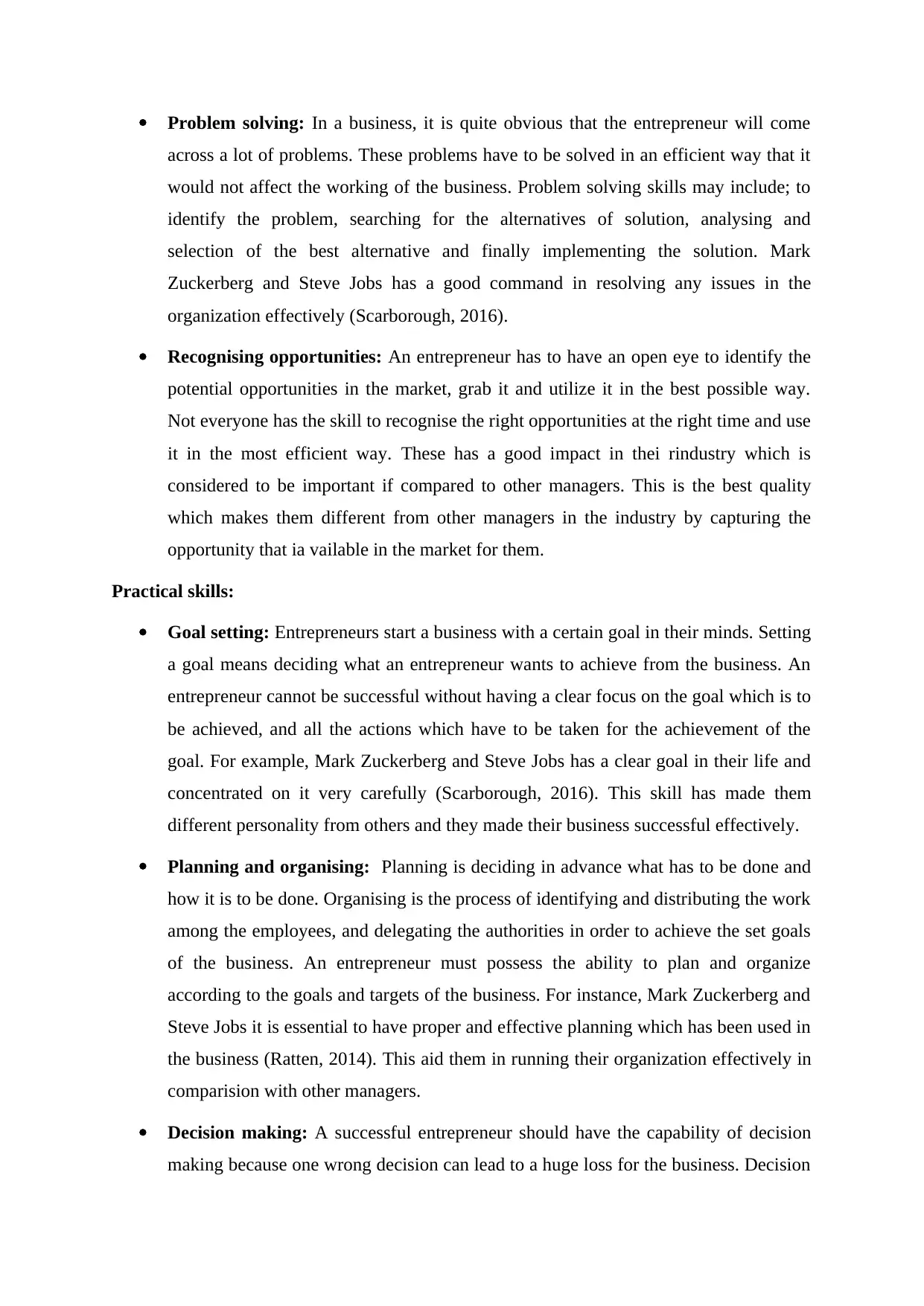
Problem solving: In a business, it is quite obvious that the entrepreneur will come
across a lot of problems. These problems have to be solved in an efficient way that it
would not affect the working of the business. Problem solving skills may include; to
identify the problem, searching for the alternatives of solution, analysing and
selection of the best alternative and finally implementing the solution. Mark
Zuckerberg and Steve Jobs has a good command in resolving any issues in the
organization effectively (Scarborough, 2016).
Recognising opportunities: An entrepreneur has to have an open eye to identify the
potential opportunities in the market, grab it and utilize it in the best possible way.
Not everyone has the skill to recognise the right opportunities at the right time and use
it in the most efficient way. These has a good impact in thei rindustry which is
considered to be important if compared to other managers. This is the best quality
which makes them different from other managers in the industry by capturing the
opportunity that ia vailable in the market for them.
Practical skills:
Goal setting: Entrepreneurs start a business with a certain goal in their minds. Setting
a goal means deciding what an entrepreneur wants to achieve from the business. An
entrepreneur cannot be successful without having a clear focus on the goal which is to
be achieved, and all the actions which have to be taken for the achievement of the
goal. For example, Mark Zuckerberg and Steve Jobs has a clear goal in their life and
concentrated on it very carefully (Scarborough, 2016). This skill has made them
different personality from others and they made their business successful effectively.
Planning and organising: Planning is deciding in advance what has to be done and
how it is to be done. Organising is the process of identifying and distributing the work
among the employees, and delegating the authorities in order to achieve the set goals
of the business. An entrepreneur must possess the ability to plan and organize
according to the goals and targets of the business. For instance, Mark Zuckerberg and
Steve Jobs it is essential to have proper and effective planning which has been used in
the business (Ratten, 2014). This aid them in running their organization effectively in
comparision with other managers.
Decision making: A successful entrepreneur should have the capability of decision
making because one wrong decision can lead to a huge loss for the business. Decision
across a lot of problems. These problems have to be solved in an efficient way that it
would not affect the working of the business. Problem solving skills may include; to
identify the problem, searching for the alternatives of solution, analysing and
selection of the best alternative and finally implementing the solution. Mark
Zuckerberg and Steve Jobs has a good command in resolving any issues in the
organization effectively (Scarborough, 2016).
Recognising opportunities: An entrepreneur has to have an open eye to identify the
potential opportunities in the market, grab it and utilize it in the best possible way.
Not everyone has the skill to recognise the right opportunities at the right time and use
it in the most efficient way. These has a good impact in thei rindustry which is
considered to be important if compared to other managers. This is the best quality
which makes them different from other managers in the industry by capturing the
opportunity that ia vailable in the market for them.
Practical skills:
Goal setting: Entrepreneurs start a business with a certain goal in their minds. Setting
a goal means deciding what an entrepreneur wants to achieve from the business. An
entrepreneur cannot be successful without having a clear focus on the goal which is to
be achieved, and all the actions which have to be taken for the achievement of the
goal. For example, Mark Zuckerberg and Steve Jobs has a clear goal in their life and
concentrated on it very carefully (Scarborough, 2016). This skill has made them
different personality from others and they made their business successful effectively.
Planning and organising: Planning is deciding in advance what has to be done and
how it is to be done. Organising is the process of identifying and distributing the work
among the employees, and delegating the authorities in order to achieve the set goals
of the business. An entrepreneur must possess the ability to plan and organize
according to the goals and targets of the business. For instance, Mark Zuckerberg and
Steve Jobs it is essential to have proper and effective planning which has been used in
the business (Ratten, 2014). This aid them in running their organization effectively in
comparision with other managers.
Decision making: A successful entrepreneur should have the capability of decision
making because one wrong decision can lead to a huge loss for the business. Decision
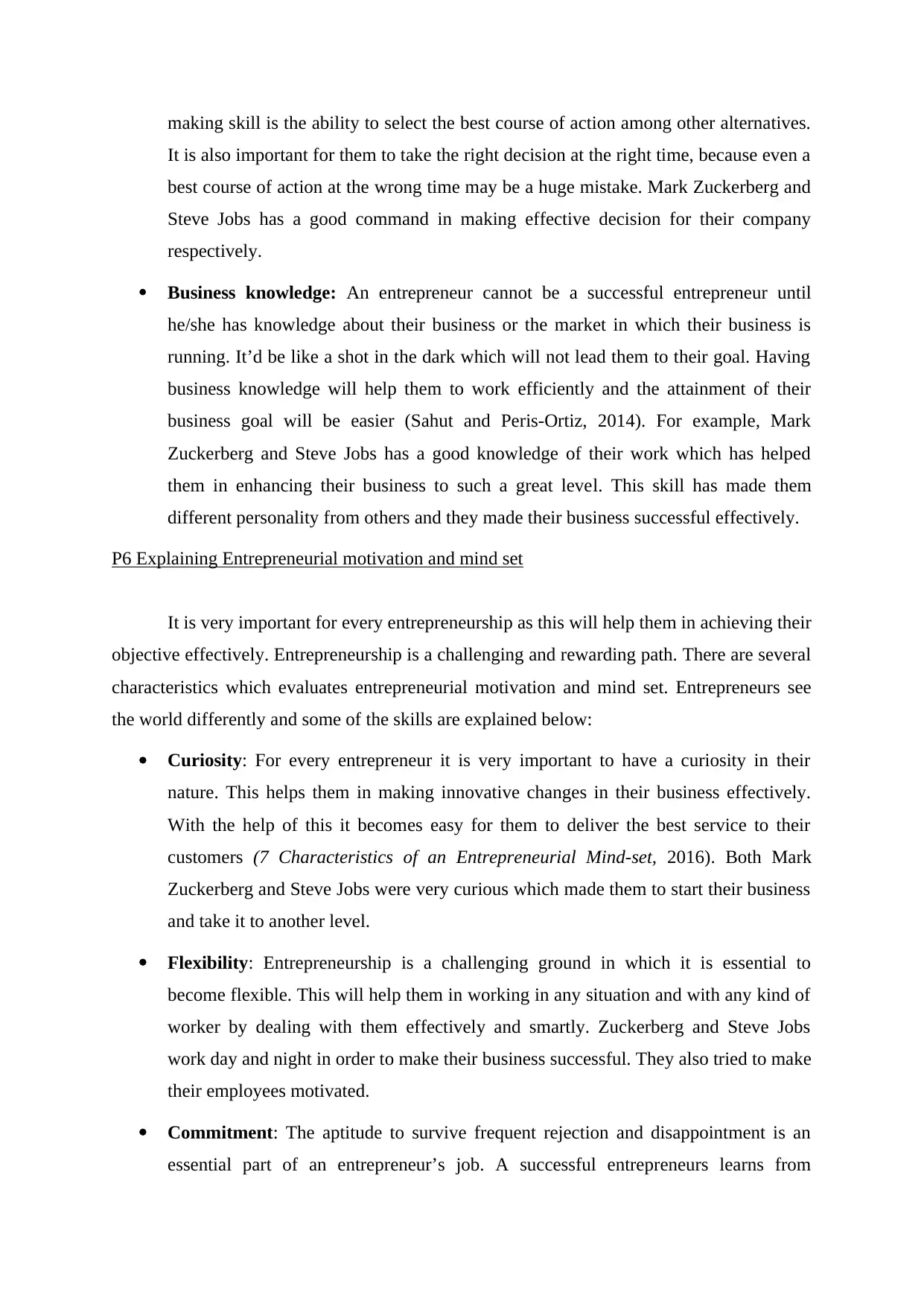
making skill is the ability to select the best course of action among other alternatives.
It is also important for them to take the right decision at the right time, because even a
best course of action at the wrong time may be a huge mistake. Mark Zuckerberg and
Steve Jobs has a good command in making effective decision for their company
respectively.
Business knowledge: An entrepreneur cannot be a successful entrepreneur until
he/she has knowledge about their business or the market in which their business is
running. It’d be like a shot in the dark which will not lead them to their goal. Having
business knowledge will help them to work efficiently and the attainment of their
business goal will be easier (Sahut and Peris-Ortiz, 2014). For example, Mark
Zuckerberg and Steve Jobs has a good knowledge of their work which has helped
them in enhancing their business to such a great level. This skill has made them
different personality from others and they made their business successful effectively.
P6 Explaining Entrepreneurial motivation and mind set
It is very important for every entrepreneurship as this will help them in achieving their
objective effectively. Entrepreneurship is a challenging and rewarding path. There are several
characteristics which evaluates entrepreneurial motivation and mind set. Entrepreneurs see
the world differently and some of the skills are explained below:
Curiosity: For every entrepreneur it is very important to have a curiosity in their
nature. This helps them in making innovative changes in their business effectively.
With the help of this it becomes easy for them to deliver the best service to their
customers (7 Characteristics of an Entrepreneurial Mind-set, 2016). Both Mark
Zuckerberg and Steve Jobs were very curious which made them to start their business
and take it to another level.
Flexibility: Entrepreneurship is a challenging ground in which it is essential to
become flexible. This will help them in working in any situation and with any kind of
worker by dealing with them effectively and smartly. Zuckerberg and Steve Jobs
work day and night in order to make their business successful. They also tried to make
their employees motivated.
Commitment: The aptitude to survive frequent rejection and disappointment is an
essential part of an entrepreneur’s job. A successful entrepreneurs learns from
It is also important for them to take the right decision at the right time, because even a
best course of action at the wrong time may be a huge mistake. Mark Zuckerberg and
Steve Jobs has a good command in making effective decision for their company
respectively.
Business knowledge: An entrepreneur cannot be a successful entrepreneur until
he/she has knowledge about their business or the market in which their business is
running. It’d be like a shot in the dark which will not lead them to their goal. Having
business knowledge will help them to work efficiently and the attainment of their
business goal will be easier (Sahut and Peris-Ortiz, 2014). For example, Mark
Zuckerberg and Steve Jobs has a good knowledge of their work which has helped
them in enhancing their business to such a great level. This skill has made them
different personality from others and they made their business successful effectively.
P6 Explaining Entrepreneurial motivation and mind set
It is very important for every entrepreneurship as this will help them in achieving their
objective effectively. Entrepreneurship is a challenging and rewarding path. There are several
characteristics which evaluates entrepreneurial motivation and mind set. Entrepreneurs see
the world differently and some of the skills are explained below:
Curiosity: For every entrepreneur it is very important to have a curiosity in their
nature. This helps them in making innovative changes in their business effectively.
With the help of this it becomes easy for them to deliver the best service to their
customers (7 Characteristics of an Entrepreneurial Mind-set, 2016). Both Mark
Zuckerberg and Steve Jobs were very curious which made them to start their business
and take it to another level.
Flexibility: Entrepreneurship is a challenging ground in which it is essential to
become flexible. This will help them in working in any situation and with any kind of
worker by dealing with them effectively and smartly. Zuckerberg and Steve Jobs
work day and night in order to make their business successful. They also tried to make
their employees motivated.
Commitment: The aptitude to survive frequent rejection and disappointment is an
essential part of an entrepreneur’s job. A successful entrepreneurs learns from
⊘ This is a preview!⊘
Do you want full access?
Subscribe today to unlock all pages.

Trusted by 1+ million students worldwide
1 out of 16
Related Documents
Your All-in-One AI-Powered Toolkit for Academic Success.
+13062052269
info@desklib.com
Available 24*7 on WhatsApp / Email
![[object Object]](/_next/static/media/star-bottom.7253800d.svg)
Unlock your academic potential
Copyright © 2020–2026 A2Z Services. All Rights Reserved. Developed and managed by ZUCOL.





